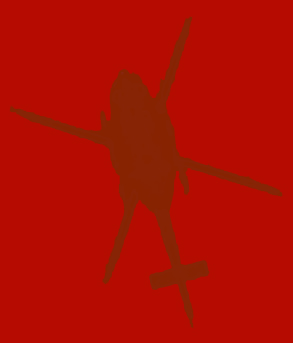
The Allegorical Power Series is an ongoing series of freely downloadable audio meant to address the possibilities and roles of abstract or experimental music as social and political response. The first release in the series was 1 June 2003, and new releases will appear monthly. For information on future releases, sign up for the Antiopic newsletter. |
previous release:
Allegorical Power Series
I
June 2003
In Heidegger, the painted image gives way to the poetic image, as a means
of confronting the Hegelian fear that art might die, that is to say, that
it might fail to do, to disclose, anything whatsoever; that it might be
dissolved into a haze of chatter and become the merely aesthetic. Post-Marx
we are confronted with the fear that art might be another tool of oppressive
capitalist (read: Enlightenment) ideology. To think art as protest means
we must have a way of speaking of the image that doesn't interpret it
as standing in an easy relationship to that which it is supposed to symbolize,
stand for, mean, signify. Art, as is language, is both immanent to Western
metaphysics and a site of resistance, even of Nietzschean twisting free,
of said metaphysics. To think art (and, while we're at it, philosophy)
as protest is to think it within a political horizon that doesn't
simply replace bad ideologies with good ones but rather calls into question
the very metaphysical assumption that images carry with them some kind
of moral dictum without thereby rendering the power of the image ineffective
and extraneous. "Real time" war coverage supposedly stands in
for the reality of war; the images rushed to us from cameras strapped
to US tanks are generally taken to be representative of what is "really"
happening. Yet this reduction of the image (particularly, the temporal
image) to a representation of real events opens up the very real possibility
that the image would, then, only serve to uphold and preserve the status
quo, to grease the wheels of ideology. If art is symbolic, which is to
say, if it is taken up as re-presenting some original, whether that original
itself be that which can never show itself save in images (as in images
of the divine, or of love) or stand in an easier relationship to its representative
(as in reflections) then certainly it is as Marx famously said, and art,
like philosophy, only "interprets the world, when the point is to
transform it"; that is to say, art and philosophy, then, only uphold
and preserve the status quo.
But if the failure of representation does not carry with it that of the image, if we can think the image not as representative but at the same time as carrying with it a kind of transformative power, then art can (even, must) be a kind of protest. The failure of representation gets taken up by Kristeva in terms of the failure of the visual arts, and in her work film holds the promise that representation might be possible; however, in Deleuze we see that film, as time-image, is no longer a cinema of the agent but rather of the seer, so the political implications become less highlighted in his work on film, though he does give us a way of speaking of art that is non-representational but also not thereby meaningless or purely aesthetic. Not enough has been said in philosophical circles, of course, about music as a kind of temporal sound image, one that would not re-present a struggle in order to evoke a response, but which would rather work to subvert, rather than preserve, ideology. Philosophy as mere critique is ideology; so is art as representation. But art, philosophy as immanent critique, as non-representative imagery; this is, or can be, transformative. We are fond, in certain circles, of declaring, after Hegel, that philosophy comes on the scene too early, and too late; that it is not useful, as Bataille rightly says, like knowing how to change a tire is useful. Yet, at least since Plato, we must affirm that philosophy (and art, the two held together like quarreling sisters), is always political, insofar as it is concerned with the human good. Certainly there is a difference between art and politics. But it is precisely in the distinction between politics and the political that a space of resistance is opened, that protest is possible. Perhaps "Allegorical Power" speaks in a space of such possibility.
—Jena Jolissaint, Eugene OR, 2003